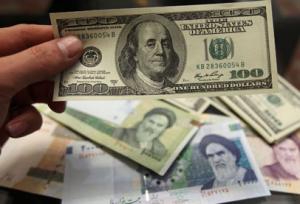PARIS: The protests that have rocked Tehran over Iran�s plunging currency expose an undercurrent of tension and the effects of sanctions, analysts say, but do not yet signal a real threat to the regime.
Despite hopeful talk from Israel of a �Persian Spring,� experts said the regime remains firmly in power and the majority of Iranians continue to support its nuclear ambitions despite sanctions.
�People are not happy with the economic sanctions but will that push them to overthrow the regime? I don�t think so,� said Thierry Coville of the Paris-based Institute of International and Strategic Relations.
The protests erupted Wednesday after the rial hit an all-time low against the dollar and shed around 40 percent of its value, as Western sanctions worsen Iran�s underlying economic problems.
Money changers said virtually no transactions were taking place in the market, making any valuation unreliable, but the rate was estimated to be around 36,000 to the dollar.
The fall has made it more difficult for ordinary Iranians to afford basic goods and seen import businesses lose millions of dollars.
Hundreds of police and security personnel flooded central Tehran Wednesday, closing foreign currency exchanges and rounding up unlicensed money-changers. Scuffles broke out with stone-throwing men, trash dumpsters were set alight and 16 people were arrested.
The rare display of public anger prompted Israeli Foreign Minister Avigdor Lieberman to suggest: �The Arab Spring will be followed by a Persian Spring, instability is spreading in Iran, and not just in Tehran.�
Western officials said the protest was a sign that pressure is having an effect.
�The sanctions are biting,� said a senior European official, speaking on condition of anonymity.
The goal, the official said, is �to bring the [Iranian] economy to its knees� and European officials are working on a new set of sanctions that may be approved later this month.
But experts were cautious.
Coville said Iranians �largely agree� with the nuclear program and are willing to resist sanctions.
�The Western strategy of trying to make Iran boil over � in the hope that there will be a political change that will make Iran stop its nuclear program � is highly dubious,� he said.
�Historically Iran is a country that has always wanted to resist Western pressure. We have to stop believing that the system of sanctions can be effective, except in impoverishing the worst-off a little more.�
The United States and the European Union have ratcheted up their sanctions on Iran this year to force it to curb its nuclear program, which they suspect includes a drive to develop atomic weapons capability.
Iran, which says its nuclear activities are purely peaceful, has had its vital oil exports severely cut as a result, and is struggling to repatriate the billions of dollars its crude sales generate.
President Mahmoud Ahmadinejad called the crisis a �psychological war on the exchange market� imposed by the West, but critics pointed fingers at Iran�s monetary policies, which discourage bank deposits and have failed to reverse sky-high inflation and unemployment.
Paul Sullivan, an adjunct professor at Washington�s Georgetown University, said an extended currency crisis would put pressure on the regime, which may not have the dollar reserves needed to prop up the rial while supporting the economy.
�The exchange rate has been in a tumble for the last year or so,� he said, adding that it �may fall to 50,000 or lower before this is over. If they had the financial muscle to prop it up they would have done it already.�
Sullivan said that the cumulative effects of sanctions may yet spark real public anger.
�Sooner or later the people will decide that it�s not going well for them,� he said. �The economy is essentially surviving on smuggling. One would expect inflation, one would expect potential instability.�
The Iran Project is not responsible for the content of quoted articles.
# Tags











